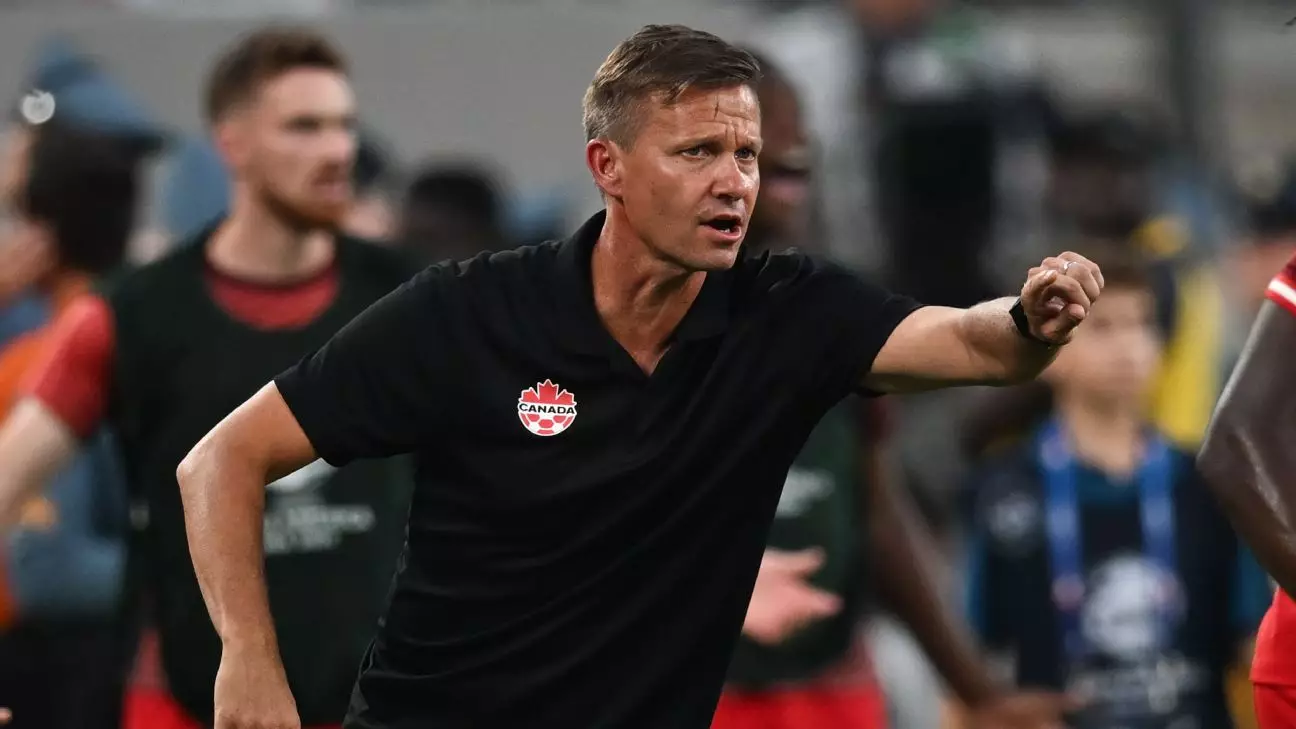In light of the upcoming Concacaf Gold Cup, Jesse Marsch, the new head coach of Canada’s national soccer team, is becoming increasingly aware of the hurdles that lie not only on the field but also off of it. His candid acknowledgment regarding potential hesitance among Canadian fans to travel to the U.S. due to the prevailing political atmosphere is not something one would often find in sports discussions. “I could see trepidation for anyone looking to travel to the U.S. at this current political climate,” he stated in a recent Zoom conference. Here lies an opportunity to confront a pressing issue—how intertwined politics and sports can foster an uneasy environment for fandom and sportsmanship.
Those in the realm of athletics should take this recognition seriously. The specter of political strife has never merely been background noise; it can heavily influence the behavior of fans and support for a team. Marsch’s reflections provide a substantial insight that transcends soccer into a broader conversation about community, identity, and belonging.
The Impact of Political Climate on Sports
Statistics revealing a dramatic decrease in Canadian residents returning from the U.S. serve as a stark reminder of current socio-political dilemmas. With a reported decline in return trips by air dropping 20% and car trips by 35% in one month alone, the implications are clear. Such figures raise pertinent questions: Are we allowing fear to govern our choices, even in celebration of sports? More importantly, how does political climate affect collective morale?
Temporary detentions of individuals, such as Canadian Jasmine Mooney, who experienced 12 days of confinement due to immigration scrutiny, cast a long shadow over the notion of a sporting event as a cultural exchange. These incidents not only deter fan attendance but also challenge the essence of sportsmanship—a space where unity and inclusiveness ought to prevail.
The Role of Coaching and Leadership
Marsch, who has an impressive coaching resume that includes major clubs across Europe and the U.S., knows too well the weight of leadership. Having taken on the role as Canada’s coach in May 2024, he embodies not just tactical acumen but also the need for emotional intelligence in guiding a team through uncertain times. While he will unfortunately be missing the technical aspect of coaching during the first two matches due to a suspension, Marsch’s leadership extends beyond the sidelines. His understanding and care for fans’ concerns set a tone for how sports teams can operate amidst political turbulence.
The reality that players are largely dependent on the support of their fans cannot be unstated. “It would be a shame if we didn’t get the kind of fan support that I think our team deserves,” Marsch remarked. This sentiment encapsulates the intricate bond between a team and its supporters, a connection that can be eroded by external fears.
The Road Ahead: Balancing Hopes with Realities
As Canada prepares to open the Gold Cup on June 17 against Honduras, the stakes become incredibly high—not just for the players but also for the nation itself. The championship is not merely a tournament; it’s an opportunity for Canada to showcase its growing prowess in international soccer. Hosting games, particularly in Vancouver, could galvanize a wave of patriotism, but the undercurrent of political unease remains. Will Canadians rally together in the face of adversity or will fear hinder full-fledged support?
With a goal of reaching the final firmly planted in their sights, the Canadian team’s journey is layered with significant potential and equally profound challenges. Competing against formidable opponents such as Mexico and the U.S., Canada has to navigate not only the hurdles on the field but also those imposed by societal issues. In a time where the world should come together through sports, the barriers erected by politics remind us that change in mindset is crucial.
As supporters consider their presence at the games, they must weigh the risks against the greater good of unity, encouragement, and demonstrating resilience in the face of adversity. The soccer field should symbolize hope and collaboration, transcending the political divisions that seek to keep us apart. During this Gold Cup, the Canadian team and its supporters stand not only as competitors but also as advocates for solidarity in a divided climate.


Leave a Reply